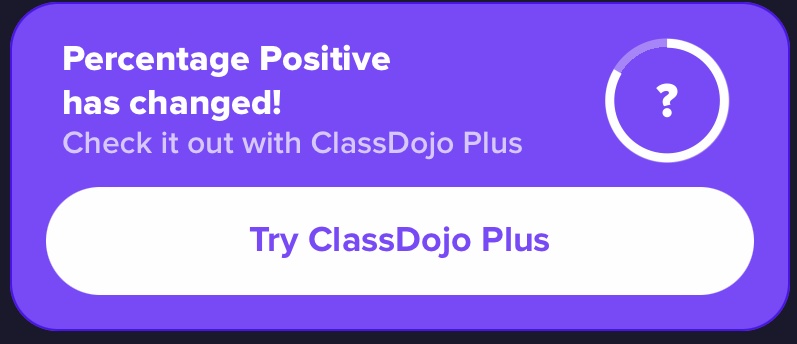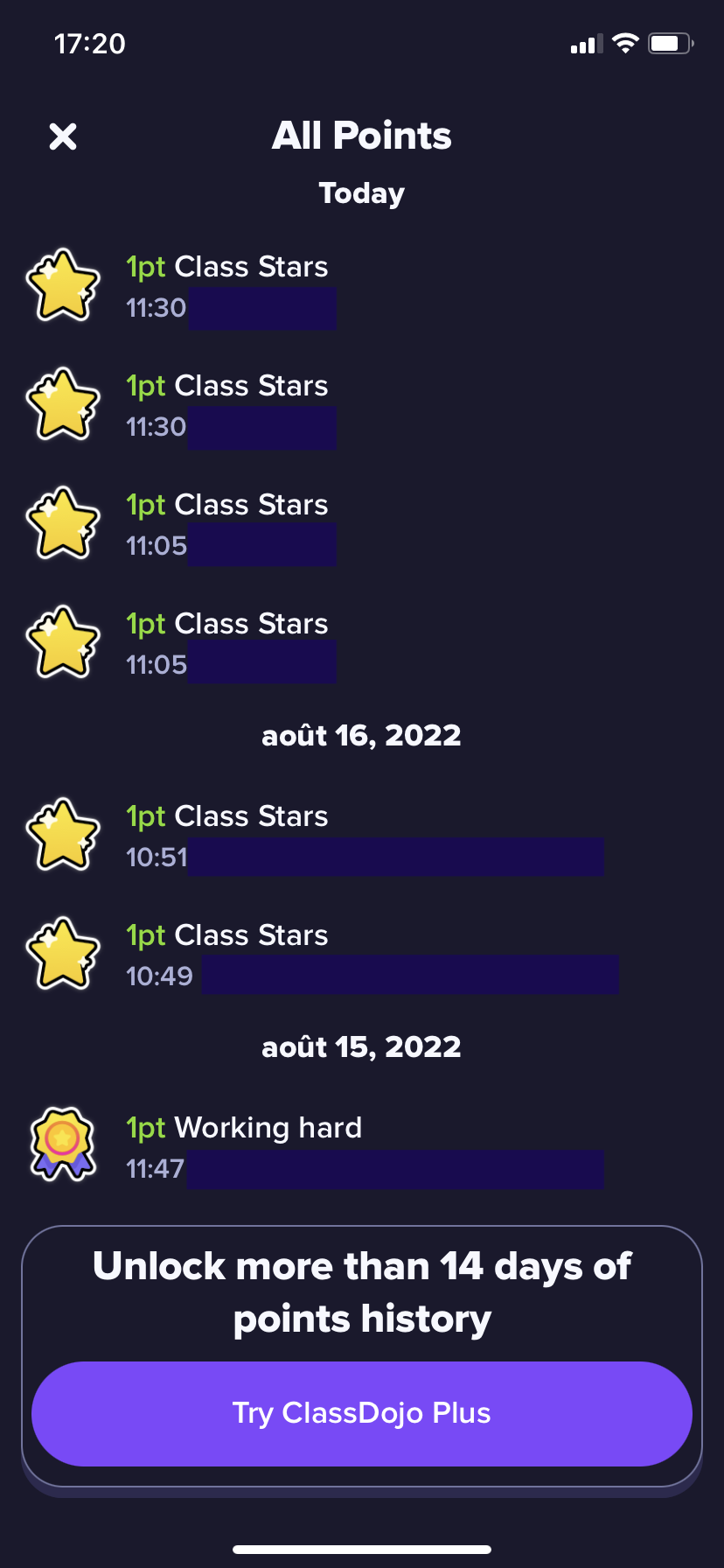ClassDojo and 'data as oil'
- 6 minutes read - 1091 wordsThe new semester at the University of Kentucky starts on Monday, and I am flailing to try to get my data science course ready to go—including putting together an open, alternative textbook for my students. I’ve been borrowing heavily from Catherine D’Ignazio and Lauren Klein’s Data Feminism for my textbook: It’s a fantastic resource, and I’m hoping my students take a lot from it.
Of course, my kid’s semester has already started, and I’ve already blogged a bunch about my frustrations with her new school’s use of ClassDojo this year. It turns out that Data Feminism is also a helpful resource here. Riffing on the common “data is the new oil” metaphor, D’Ignazio and Klein argue that:
It’s a metaphor that resonates uncannily well—even more than they likely intended. The idea of data as some sort of untapped natural resource clearly points to the potential of data for power and profit once they are processed and refined, but it also helps highlight the exploitative dimensions of extracting data from their source—people—as well as their ecological cost. Just as the original oil barons were able to use their riches to wield outsized power in the world (think of John D. Rockefeller, J. Paul Getty, or, more recently, the Koch brothers), so too do the Targets of the world use their corporate gain to consolidate control over their customers. But unlike crude oil, which is extracted from the earth and then sold to people, data are both extracted from people and sold back to them….
I’m not the first person to make the observation that ClassDojo’s business model relies on 1) having other people collect the data and 2) proceeding to sell access to that data to others—sometimes including the same people who collected it. Ben Williamson and Alasdair Rutherford raised this point in a 2017 blog post (I also recommend Williamson’s scholarly articles on ClassDojo, which get more into these details):
Parents, for example, could purchase ClassDojo reports to make inferences about their children and their peer groups. School leaders might purchase ready-made reports to single out children for specific classes or special behaviour programmes. Local government departments could buy the data to compare schools’ performance, much as schools are already judged in terms of test scores. In this business model, ClassDojo treats teachers as unpaid data entry clerks contributing to a huge database that can be analysed from far away to generate insights that parents, school leaders and local authorities might then purchase.
As I’ve been actually using the ClassDojo app, though, it’s been wild to see how this theoretical, abstract critique translates into reality. Yesterday, after a few days of not checking the app, I opened it up, not out of any interest in “how kiddo is doing” but more to see what the school is up to and how grumpy I should be about it. It’s hard to get anywhere in the app, though, without ClassDojo hitting me up for money.
I don’t know what Percentage Positive is, for example, but apparently if I want access to that, I’m going to have to fork over money:

Here’s a wild one: If I want to see my kid’s point history further back than 14 days, I’m also going to have to pay for it. Seriously?

Please also note the inclusion of French months in an otherwise-English interface. This is partly my fault, since my iOS system language is set to French but my ClassDojo interface is set to English. However, ClassDojo advertises translation features as one of its selling points, and the crudeness with which these languages have been mashed together makes me more skeptical about that advertising than I already was.
So, let’s sum things up here. When data is collected in ClassDojo, it’s a response to things that my kid has done (to her school’s credit, they are currently only recording positive feedback, but I don’t think that’s going to last). Thus, all ClassDojo data originates with student actions. However, that data also has to be recorded by teachers to make its way into ClassDojo. In short, whatever “oil” exists here is produced by my kid and then extracted by teachers.
Yet, who is it that makes all the money from this oil? That’s right, ClassDojo. To be fair, I don’t know the exact terms of any contract the school might have with ClassDojo (though I’d sure as heck like to read it). If any ClassDojo Plus memberships from school-affiliated parents result in a kickback to the school, that would be somewhat better, but I doubt that’s the case. In fact, Williamson has speculated that schools themselves probably have to pay to get school-wide analytics for data that teachers in that school are, themselves, collecting. Once again, I’d need to (and love to) look at the contract before being sure of the details here.
Even with the admittedly meager information I have, though, this business model strikes me as wildly unethical. ClassDojo is trying to sell me access to data that originates with my kid’s actions and the labor of overworked, underpaid teachers. There is no good reason—unless you count platform capitalism to be a good reason—that I shouldn’t have access to that data from the get-go.
Better yet, I got an email this morning from Caitlin at ClassDojo encouraging me to add my own labor to this data economy:
Hi S [I refused to use my whole name in a meaningless gesture of resistance],
Liking or commenting on their photos and videos lets [kiddo]’s teacher know that you’d love to see more magic moments from the classroom. 🪄
Snapshots from their day keep you connected to [kiddo] as they ponder a math problem, paint a picture, or conduct an experiment. 🧪
Check out their latest Class Story and share a like or a comment to encourage [kiddo]’s teacher to keep on posting!
It’s very strange how upfront about their motives ClassDojo is here. Why should I like and comment on photos and videos? To encourage kiddo’s teacher to keep using the damn app, so that they feel like ClassDojo is useful and continue to use it, so that a company can keep making money off of this data. Even I, the parent that ClassDojo is hoping will pay for this oil-like data that my child has produced, can be conscripted into performing labor for the cause.
Data is the new oil, but somehow even I am expected to help extract the oil that ClassDojo is going to make me pay for. What a dumb app this is.
- data feminism
- Catherine D'Ignazio
- Lauren Klein
- data science
- ClassDojo
- ICT 661
- OER
- alternative textbooks
- Ben Williamson
- Alasdair Rutherford
- edtech
- data as oil
similar posts:
why 'open access' isn't enough
This summer, I’m remixing an alternative textbook for my Fall intro to data science class, and I’m pleasantly surprised by how helpful Creative Commons-licensed journal articles are proving. Shows that “open access” is only part of license’s benefits.
parent agency and edtech
I hate myself for creating a ClassDojo account, but kiddo’s school is going all-in, so not sure I have the choice. First observation is how confident the app is that it can make me pay extra for free software I don’t want to use in the first place.
comments:
You can click on the < button in the top-right of your browser window to read and write comments on this post with Hypothesis.